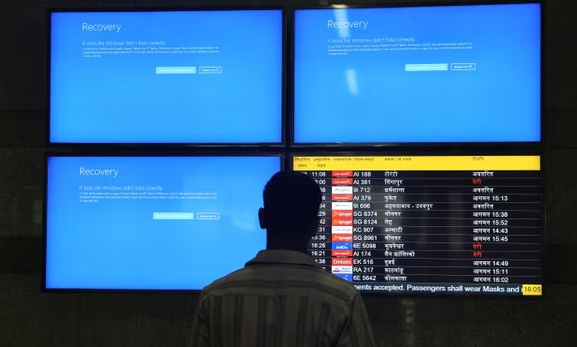A global technology outage caused by a software update from US cybersecurity company Crowdstrike caused chaos around the world on Friday, with flights suspended and healthcare, banking and ground transport systems facing major disruptions.
George Kurtz, president and CEO of Crowdstrike, said Friday morning that the company is “actively working with customers affected by a flaw discovered in one content update for Windows hosts” – a glitch that affected Microsoft users around the world. He also added:
“This is not a security incident or cyberattack. The issue has been identified, isolated, and a fix has been deployed. We refer customers to the support portal for the latest updates and will continue to provide complete and continuous updates on our website. We further recommend organisations ensure they’re communicating with CrowdStrike representatives through official channels. Our team is fully mobilised to ensure the security and stability of CrowdStrike customers.”
The Financial Times explained that Crowdstrike is “one of the world’s largest providers of “endpoint” security software, used by companies to monitor for security problems across a huge range of devices, from desktop PCs to checkout payment terminals.”
Troy Hunt, a security consultant, wrote on social media that “this will be the largest IT outage in history.” He also added:
“This is basically what we were all worried about with Y2K, except it’s actually happened this time.”
The impacts of the outage cascaded rapidly. Wired noted that “in the early hours of Friday, companies in Australia running Microsoft’s Windows operating system started reporting devices showing Blue Screens of Death (BSODs).” It continued:
“Shortly after, reports of disruptions started flooding in from around the world, including from the UK, India, Germany, the Netherlands, and the US: TV station Sky News went offline, and US airlines United, Delta, and American Airlines issued a “global ground stop” on all flights.”
The UK has been hit by a glitch
As The New York Times observed, the National Health Service in the United Kingdom “was crippled throughout the morning on Friday, as a number of hospitals and doctors offices lost access to their computer systems.”
Whitehall crisis officials were coordinating the response through the Cobra committee that deals with matters of national emergency or major disruption. Ministers were in touch with their sectors to tackle the fallout from the IT failure, and the transport secretary, Louise Haigh, said she was working “at pace with industry” after trains and flights were affected, The Guardian reported.
In the US, flights were grounded owing to communications problems that appear to be linked to the outage. American Airlines, Delta and United Airlines were among the carriers affected. Berlin airport temporarily halted all flights on Friday, while in Australia, Melbourne airport advised customers it was “experiencing a global technology issue which is impacting check-in procedures for some airlines.”
Global flight cancellations
There had been more than 1,000 flight cancellations worldwide so far due to the IT failure, according to the aviation analysis firm Cirium.
Long lines formed at airports in Asia as airlines lost access to check-in and booking services at a time when many travelers are heading away on summer vacations. News outlets in Australia — where telecommunications were severely affected — were pushed off air for hours. Hospitals and doctor’s offices had problems with their appointment systems, while banks in South Africa and New Zealand reported outages to their payment system or websites and apps.
At Hong Kong’s airport, Yvonne Lee, 24, said she only found out her flight to Phuket in Thailand was postponed to Saturday when she arrived at the airport, saying the way it was handled would “affect the image of Hong Kong’s airport very much.” Her already short five-day trip would now have to be further shortened, she said.
In India, Hong Kong and Thailand, many airlines were forced to manually check in passengers. An airline in Kenya was also reporting disruption.
Some athletes and spectators descending on Paris ahead of the Olympics were delayed as was the arrival of their uniforms and accreditations, but Games organisers said disruptions were limited and didn’t affect ticketing or the torch relay.
In Germany, Berlin-Brandenburg Airport halted flights for several hours due to difficulties in checking in passengers, while landings at Zurich airport were suspended and flights in Hungary, Italy and Turkey disrupted.
The Dutch carrier KLM said it had been “forced to suspend most” of its operations.
Amsterdam’s Schiphol Airport warned that the outage was having a “major impact on flights” to and from the busy European hub. The chaotic morning coincided with one of the busiest days of the year for Schiphol.
Israel said its hospitals and post office operations were disrupted.
In South Africa, at least one major bank said it was experiencing nationwide service disruptions as customers reported they were unable to make payments using their bank cards in stores. The New Zealand banks ASB and Kiwibank said their services were down as well.
Shipping was disrupted too: A major container hub in the Baltic port of Gdansk, Poland, the Baltic Hub, said it was battling problems resulting from the global system outage.
Russia was unaffected by the outage
Meanwhile, Russia was less affected by this outage, mainly due to sanctions, import substitution strategy and technological sovereignty.
The global IT failure of devices running the Windows 10 operating system did not affect the operation of Russian airports and airlines, with flights running as scheduled. There are no problems with the information systems of Russian Railways.
“Rosatom” reported that the systems of the concern “Rosenergoatom” work on “import-independent software,” so there are no problems in operation. The disruption in Microsoft’s work will not affect the operation of Russia’s energy system in any way, the agency said.
